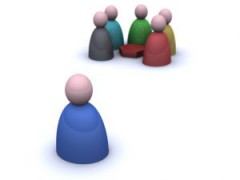Does Group Reflection Affect Individual Learning?
 [We’re pleased to welcome Alexander R. Bolinger who collaborated with Julie V. Stanton on the paper “The Gap Between Perceived and Actual Learning from Group Reflection” recently published in Small Group Research.]
[We’re pleased to welcome Alexander R. Bolinger who collaborated with Julie V. Stanton on the paper “The Gap Between Perceived and Actual Learning from Group Reflection” recently published in Small Group Research.]
• What inspired you to be interested in this topic?
Both my co-author and I have used group reflection as a pedagogical tool in conjunction with group projects in our classes. Previous research has investigated the effects of group reflection on group learning, but we were interested in exploring whether reflecting in groups facilitated individual learning. So our research was stimulated by a question that came up from our teaching.
• Were there findings that were surprising to you?
Yes, we were surprised to find that individuals who reflected alone perceived that they had learned more on a task than individuals who reflected in groups, even though individuals who reflected in groups did improve from the first task to the second task.
We discovered that there is a gap between how much individuals perceive that they have learned and how much they actually improved. Discovering this gap between perception and actual results was interesting to us because it helps us to understand one of the reasons why many individuals dislike group work even when they stand to benefit from working with others.
• How do you see this study influencing future research and/or practice?
One direction for future research is to explore the factors that affect individuals’ subjective interpretations of the efficacy of working in and learning from groups. That is, in lieu of concrete evidence of their learning, what “criteria” do group members use to decide whether or not they actually learned?
Another direction for future research is to systematically examine the content of what groups reflect on. So far, much of the research on group reflection focuses on whether or not group members reflect, but the content (i.e., sophistication, depth of analysis) of the reflection may be equally important in understanding the extent to which reflecting with others benefits individuals.An implication of this research is that practitioners should be aware of the gap between individuals’ perceptions of their learning and how much they actually improve from working in groups. Group managers may need to educate group members, demonstrating improvements with specific evidence, to persuade them of the benefits of working in groups.
“The Gap Between Perceived and Actual Learning from Group Reflection” from Small Group Research can be read for free by clicking here. Want know about all the latest from Small Group Research? Click here to sign up for e-alerts!
 Alexander R. Bolinger is an assistant professor of management at Idaho State University, USA. His research interests include group work and its effects on group members, negotiation, and service work. His research has also appeared in Organizational Behavior and Human Decision Processes and Cornell Hospitality Quarterly.
Alexander R. Bolinger is an assistant professor of management at Idaho State University, USA. His research interests include group work and its effects on group members, negotiation, and service work. His research has also appeared in Organizational Behavior and Human Decision Processes and Cornell Hospitality Quarterly.
 Julie V. Stanton is an associate professor of business at The Pennsylvania State University, USA. Her research explores the grouping mechanisms that facilitate small producer participation in export-oriented distribution channels, including cooperatives. Her research has also appeared in Supply Chain Management and World Development, among other outlets.
Julie V. Stanton is an associate professor of business at The Pennsylvania State University, USA. Her research explores the grouping mechanisms that facilitate small producer participation in export-oriented distribution channels, including cooperatives. Her research has also appeared in Supply Chain Management and World Development, among other outlets.






























































































